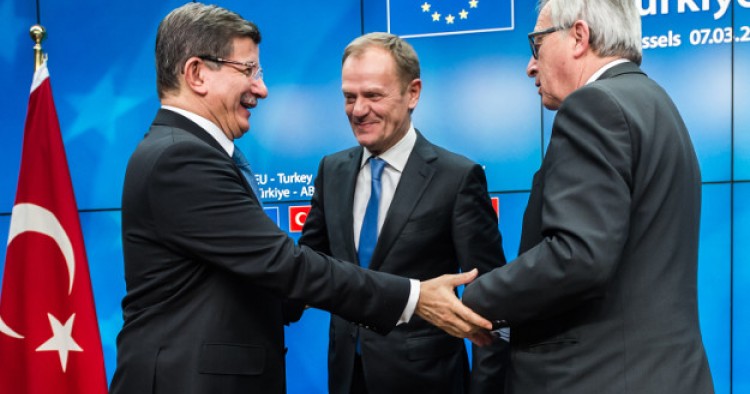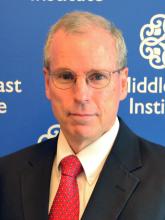In this week's Monday Briefing, MEI experts Gonul Tol, Robert S. Ford, and Marvin G. Weinbaum provide analysis on recent events including the E.U.-Turkey summit in Brussels to discuss the Syrian refugee crisis, the ceasefire agreement in Syria, and the status of peace talks with the Taliban in Afghanistan.
E.U., Turkey Talk Refugee Plan
By Gonul Tol, Director of MEI's Center for Turkish Studies
The European Union is doing exactly what the European Council President Donald Tusk said it could not do in November: it is "outsourcing the obligation to protect the Union's external borders to a third country." At the E.U.-Turkey summit in Brussels on Monday, European leaders are calling on Ankara to help stop refugees trying to reach Greece across the Aegean Sea. The summit will build on the joint E.U.-Turkey plan inked between Brussels and Ankara in November in which the E.U. pledged €3 billion ($3.3 billion) to support millions of refugees in Turkey, as well as reviving long-stalled talks on lifting visa requirements for Turks and Ankara's bid to join the bloc.
Monday's summit might be a turning point for Europe, which is struggling to tackle the refugee crisis. But many in Turkey wonder: at what cost? The E.U. has long played a constructive role in Turkey's democratization. Turkey's candidacy to the European Union has constituted a major driving force behind the adoption of several democratization reforms. Recently, however, Brussels seems to have turned a blind eye to Turkey's democratic deficit in return for Ankara's cooperation in stemming the flow of refugees. Brussels delayed the publication of a highly critical report on Turkey's free speech record until after its election in November to keep Ankara on-board. E.U. countries have been disturbingly silent on President Recep Tayyip Erdogan's increasingly authoritarian tendencies that were once matters of deep concern for many European countries, until the migration crisis blew up.
But the E.U. might not get what it wants from its high-risk/high-reward strategy. An authoritarian Turkey struggling with economic hardships and security challenges coupled with lack of an institutional framework to integrate the Syrian refugees is unlikely to play the role its E.U. partners want it to play. Syrian refugees living in Turkey seem unwilling to give up their quest for the better life that they think E.U. has to offer.
Turkey has been using Brussel's desperation to get more out of the deal. On Monday, Prime Minister Ahmet Davutoglu offered the European Union greater help to stem a flood of migrants but demanded more money, faster accession talks and quicker visa-free travel for its citizens in exchange. Brussels seems ready to consider Davutoglu's demands, but this would embolden Erdogan's authoritarianism at home, destabilizing the host of three million refugees and do little to stem the refugee flow.
Aleppo the Key to Syria Cease-fire
By Robert S. Ford, MEI Senior Fellow
In the days ahead, the Aleppo triangle consisting of the Syrian army, the rebels and Kurdish YPG forces will be the main litmus test on whether the deal holds.
The cessation of hostilities has been more widely respected than most analysts anticipated. In the days ahead, the Aleppo triangle consisting of the Syrian army, the rebels and Kurdish YPG forces will be the main litmus test on whether the deal holds. Moves by the government and the Kurds to block all remaining supply access to rebel-held portions of Aleppo city could prompt rebels to launch counterattacks and perhaps undermine the tenuous effort to start political settlement talks.
Those political talks are supposed to start on March 10 in Geneva. It is unlikely fast progress will be made, but agreement on confidence-building measures in the weeks ahead suggest real political deals might eventually be possible.
However, the Syrian government's announcement that it will hold parliamentary elections next month complicates the political talks since it is most unlikely the opposition could or would participate in those elections.
Afghan Peace Talks Hanging By a Thread
By Dr. Marvin Weinbaum, MEI Scholar
The idea that the Taliban would be ready to consider joining a government headed by Ashraf Ghani was never realistic.
The peace talks are hanging by a thread. There's a strong likelihood that they will not be revived anytime soon. In their desperation to find a shortcut to end the Afghan conflict, those who have tried to get the Taliban to participate have thrown a "Hail Mary," and it failed.
The idea that the Taliban would be ready to consider joining a government headed by Ashraf Ghani was never realistic. He represents everything that the insurgents detest in a modern, liberal democratic political system.
Even were some Taliban leaders willing to join in negotiations under pressure from Pakistan, it is doubtful that they would be able a deliver a cease-fire, much less get all elements of the insurgency to agree to a political settlement. The Taliban is too fractured to agree on any kind of concessions, as is the Afghan unity government to consider seriously any Taliban proposals. And if talks ever do begin, it will be the Taliban, coming from a position of strength, that would hold the bargaining advantage.
The Middle East Institute (MEI) is an independent, non-partisan, non-for-profit, educational organization. It does not engage in advocacy and its scholars’ opinions are their own. MEI welcomes financial donations, but retains sole editorial control over its work and its publications reflect only the authors’ views. For a listing of MEI donors, please click here.
















